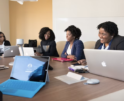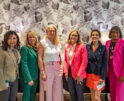
Frank Talk About Race & Gender
Progress! We’re having more conversations about race and gender, and we’re more comfortable having this difficult dialogue—a crucial skill for any leader. At least, we know this is the case for the leaders and emerging leaders who are part of the exclusive Pink Power Alliance.
At the recent Power Alliance Zoominar on the topic, 97% of attendees said they are having more conversations on sensitive issues. An impressive 52% said their comfort level improved over the last year. 15% however, said they were actually less comfortable talking about bias at work than they had been in the past, but, by the end of our hour-long program, those who said their comfort level improved, increased – right there in real-time – to a whopping 93% as a result of diving into the topic with our thought leaders.
This is a good thing, though progress has come on the heels of deep unrest, said Managing Director of Accenture’s Atlanta office, Chloe Barzey, “It’s unfortunate that so much hate and bigotry had to be the catalyst to get us to join together… but… we’ve made a lot more advances in the last year than I’ve seen, maybe in my lifetime.”
All our speakers agreed race and gender bias are not easy to talk about. “Those real conversations are uncomfortable, and if we’re more uncomfortable now than we used to be, then I think we’re closer to the root of what we need to be talking about,” said Tracy Reznik, a Director at Jabian Consulting.
And Emily Borna, a principal attorney at Jackson Lewis and a specialist in labor and employment law, said companies are taking this more seriously than ever. “Equity and inclusion is the goal. It requires a devoted strategy, awareness, and action to turn what could be a legal risk into a competitive advantage in the marketplace.”
CHECK OUT THE LINEUP FOR NEXT THURSDAYS POWER ALLIANCE ZOOMINAR + JOIN US.
More companies are stepping up to take real action. Accenture for instance, now sets “tangible goals around the representation of women… and people of color in the workforce; and we report on it,” says Chloe. Accenture has also increased employment opportunities for those who “wouldn’t normally have jobs,” and they make diversity and inclusion training mandatory, while “encouraging more open dialogue.”
We know this issue is crucial. According to recent Accenture data, 77% of women surveyed said, “an inclusive culture is vital to their ability to advance and thrive.” Chloe, who leads Accenture’s vision and operations across Georgia, Tennessee, and Alabama and is the executive sponsor for several corporate diversity programs, told the Pink group, the key is to “Seek to understand. We’re all human and people first.” And Tracy says rather than talking about what needs to happen, “incorporate and embed DE&I into every business decision and policy, tie it to comp, tie it to performance.” Companies should “hold themselves accountable to do something about it.”
So, how can women tap into the global move toward more diversity, equity, and inclusion and advance in the process? While town hall meetings help, our speakers recommended smaller groups like the breakout sessions Pink had during the Power Alliance Zoominar. And if possible, said Chloe, “My advice is to have [conversations] one on one because as we can get to know people better we can understand people better and that helps eliminate some of that bias.”
The speakers agreed, we need to take a closer look at ourselves and our own attitudes and biases. Emily said “step up your awareness on a personal level. Pay attention to those occasions where you might have made a misstep due to your blind spots… Oppose your own stereotypical thinking.” Tracy agreed, “Be self-reflective and be vocal about that. If you need to have a conversation with someone that’s a little scary, you can say that too. That’s part of self-reflection and awareness.” Chloe suggested, “getting to know one person who is different.” And Tracy added, “Ask questions. Question yourself and ask questions of others.”
The big takeaway was to not shy away from stepping into this arena, to have conversations that risk offending people we work with and care about—in order to understand. Says Emily, “Move toward this issue even if it disrupts your comfort level.” We will make mistakes, but the price of not speaking to one another about it will only keep exclusionary systems alive. And what Chloe added is paramount, “We need to give each other grace.”
There’s hope. By 2024 minorities are projected to be the majority, noted Emily. She and our other speakers have school-age children at home. Because of it, they say they anticipate a better future since they notice their children are more aware, sensitive to, and comfortable with diversity. “As long as we continue to support each other as leaders and women,” says Chloe, “we can be the change we want to see.”
Key Takeaways:
1.) Expect & embrace mistakes. Our thought leaders emphasized the importance of making space to make mistakes. We’ve spent generations not speaking openly about racism and sexism. Staying silent for fear of saying the wrong thing feeds separation and the status quo.
2.) Speak up when you see inequities. When you see something, say something – others are listening.
3.) Discuss diversity in high-level meetings, not just when the topic is diversity, equity, and inclusion. Make this part of every business decision.
4.) Look at your company. Check to see if leadership is investing in diversity, does the person in your company’s DE&I role report directly to the CEO, recruit differently to reach minority hires, measure and report statistics.
CLICK to WATCH THE May 2021 Pink Power Alliance Zoominar VIDEO
Note:
For the PINK team, it has been rewarding to offer this ongoing program. Many of you have shared stories about the positive impact it has had. Just last week one rising star at a global company shared that as a result of some of the leadership tools she learned, she had the nerve to reach out to her CEO. Their conversation scheduled for 15 minutes, lasted nearly a half-hour. Now, she is on the radar I believe for a key role in the organization. It’s about time. Over the years we’ve featured and watched extraordinary women painstakingly slowly, rise up; from UPS CEO Carol Tomé to Melody Hobson, now Chair of the Starbucks board, Accenture CEO Julie Sweet, and Walgreen’s CEO Roz Brewer. Today these diverse women run some of the largest and most important companies in the world. But how many other women ought to rise up too so they can make their mark, improve their organizations, and empower many others? If you think this dialogue and development skills will benefit you or women in your company ~ you can find DETAILS HERE.
On A Personal Note:
I’ll admit that reentry as the pandemic winds down hasn’t been easy-peasy. I’m reluctant to return to my pre-Covid in-person meeting schedule and I’m grappling with how to hold onto the deep, almost euphoric serenity I experienced during the quarantine. I’m having trouble getting around to wearing those suits and heels gathering dust. And I’m not sure they’ll conform to my post-Covid body or feet anyway; and frankly, I’m not sure they ever really did as I forced my way into three-inch heels and skirts that zipped tight at the waist. But, on the upside, I’ve learned how to find morel mushrooms in the spring, and chanterelles in the fall. I learned the names of trees I walked right past, hardly noticing for decades; Georgia’s sweetgum, maple, hardwood, oak, and ash trees. I discovered natural life teaming all around me—as if it was something new. And I found it to be intoxicating. And maybe it took this step back to realize, I need it to survive—the air—breath—the very thing that, for so many, the virus and prejudice we’ve been living with took away.
I’ve also revised my life plan, a plan still very much in progress and constantly being edited. I met my sister-in-law finally for the first time in person. You can meet her too since Josephine Good appeared with us on the recent Pink zoom. She shared that in China where she has spent her entire life, she didn’t experience race discrimination because “everyone is Chinese.” She told us her boss and her bosses’ boss were women. It will be interesting to watch her career to see how she experiences these things now that she is in the United States. I will be watching with high hopes, love, and fascination to see what happens to all of us next.
WHAT’S NEXT:
Join us for upcoming Pink Power Alliance deep-dive conversations and intimate networking with business leaders on the last Thursday of every month.
Click HERE to sign up today.
SAVE THE DATE
PINK’s 17th Annual Signature Fall Empowerment Event live again, in Atlanta on October 18th, 2021; featuring America’s top women business leaders and their success secrets including Walmart’s Chief People Officer, Donna Morris.
DETAILS HERE.
If you’d like us to feature your story/your blog ~ contact Erin Baule and we’ll do it! [email protected]
Thanks so much for being part of this community ~ and making all things possible.
Resources to Learn More:
From Accenture’s Chole Barzey:
-Several Arianna Huffington books available that offer excellent advice; the most recent of which, came out from Thrive Global on March 23 of this year, all available here.
–Thrive Global focuses on improving mental health.
–Empowering Yourself, The Organizational Game Revealed by Harvey Coleman The book came out in 2010, but I love it and I have had Harvey come speak at Accenture.
From Jackson Lewis’ Emily Borna:
–This TED Talk by Vernā Myers:
By Cynthia Good
“It is not our differences that divide us. It is our inability to recognize, accept and celebrate those differences.” Audre Lorde, Poet
Recommended
-
Letting Go Of Trying Harder To...January 23rd, 2024
-
What’s Your Legacy?December 18th, 2023
-
Get Ready And Resilient For Th...October 18th, 2023
-
Elevating The Workplace Experi...August 19th, 2023
-
The Secret To Employee Engagem...May 22nd, 2023

















